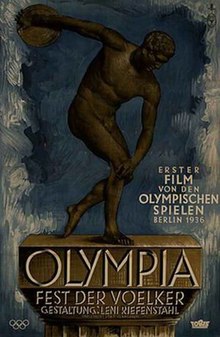
Back Олимпия (филм) Bulgarian Olympia (film 1938) Breton Olympia (pel·lícula) Catalan Olympia (Film) German Ολυμπία (ταινία 1938) Greek Olimpio (filmo 1938) Esperanto Olympia (película) Spanish Olympia (1938ko filma) Basque المپیا (فیلم ۱۹۳۸) Persian Olympia (elokuva) Finnish
| Olympia | |
|---|---|
 Part 1 poster | |
| Directed by | Leni Riefenstahl |
| Written by | Leni Riefenstahl |
| Produced by | Leni Riefenstahl |
| Cinematography | Paul Holzki |
| Edited by | Leni Riefenstahl |
| Music by | |
Production company | Olympia-Film |
| Distributed by | Tobis |
Release date |
|
Running time | 226 minutes |
| Country | Germany |
| Language | German |
| Budget | 2.8 million ℛ︁ℳ︁ |
| Part of a series on |
Olympia is a 1938 German documentary film written, directed and produced by Leni Riefenstahl, which documented the 1936 Summer Olympics, held in the Olympic Stadium in Berlin during the Nazi period. The film was released in two parts: Olympia 1. Teil — Fest der Völker (Festival of Nations) (126 minutes) and Olympia 2. Teil — Fest der Schönheit (Festival of Beauty) (100 minutes). The 1936 Summer Olympics torch relay, as devised for the Games by the secretary general of the Organizing Committee, Dr. Carl Diem, is shown in the film.
Many advanced motion picture techniques, which later became industry standards but which were groundbreaking at the time, were employed, including unusual camera angles, smash cuts, extreme close-ups and placing tracking shot rails within the bleachers. Although restricted to six camera positions on the stadium field, Riefenstahl set up cameras in as many other places as she could, including in the grandstands. She attached automatic cameras to balloons, including instructions to return the film to her, and she also placed automatic cameras in boats during practice runs. Amateur photography was used to supplement that of the professionals along the course of races. Perhaps the greatest innovation seen in Olympia was the use of an underwater camera. The camera followed divers through the air and, as soon as they hit the water, the cameraman dived down with them, all the while changing focus and aperture.[1]
While the craft employed are almost universally admired, Olympia is controversial due to its political context and propaganda value. Nevertheless, it appears on many lists of the greatest films of all time, including Time magazine's "All-Time 100 Movies".[2]
- ^ Barnouw, Erik (1993). Documentary. Oxford University Press. p. 108-109. ISBN 978-0-19-507898-5.
- ^ Cite error: The named reference
timewas invoked but never defined (see the help page).
© MMXXIII Rich X Search. We shall prevail. All rights reserved. Rich X Search